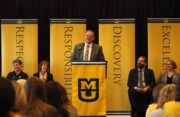College of Education eMINTS National Center awarded $22.4 million to help rural schools in Missouri and Kansas
October 24th, 2018
COLUMBIA, Mo. – University of Missouri College of Education officials announced today that the college’s eMINTS National Center has received two U.S. Department of Education grants, including the largest one in the history of the college. The grants total more than $18.6 million in federal funds and $3.8 million in private sector matching funds. The money will be used to expand a successful educational technology professional development program into rural schools in Missouri and Kansas.
“Teachers and students throughout Missouri’s 114 counties depend on the MU College of Education’s outreach programs to support teachers and enhance the educational process,” Chancellor Alexander Cartwright said. “These grants will help the college continue to provide an affordable, excellent education to students throughout Missouri, especially in rural communities where resources like these can change lives.”
The awards support MU’s goal to double research funding in the next five years and the college’s goals of strengthening STEM education and learning technologies in classrooms. eMINTS, or Enhancing Missouri’s Instructional Networked Teaching Strategies, is a non-profit organization that has provided research-based professional development services to educators since 1999. eMINTS certified teachers are in more than 3,000 classrooms throughout the U.S. and more than 250 instructional specialists are certified to introduce eMINTS programs in their schools. These grants bring the eMINTS National Center’s total awards to more than $30 million.
The $22.4 million total includes:
- A $14.6 million Supporting Effective Educator Development grant from the U.S. Department of Education, and a $3.42 match from audio visual equipment supply company Kansas City Audio-Visual. This award is the largest in the college’s history.
- A $4 million Education Innovation and Research Award from the U.S. Department of Education, and a $400,000 match from Kansas City Audio-Visual
“At eMINTS, we strive to help schools and educators bring together technology and effective teaching practices,” said Christine Terry, director of eMINTS. “Students use the knowledge and skills they are learning to solve problems that are meaningful. That means technology is not an “add-on” to learning but a tool for communicating ideas, collaborating with peers, collecting data and analyzing information.”
The Supporting Effective Educator Development grant will help MU increase STEM education in 58 high-need, rural middle schools over the course of five years. More than 406 educators and 26,796 students are expected to benefit from new technology and an academic structure built to engage learners.
“This funding facilitates an incredible collaboration among researchers and practitioners in learning technologies, problem-based learning, social-emotional learning and STEM education to enhance teaching and learning environments in rural communities,” said Kathryn Chval, dean of the College of Education. “We are simply thrilled to lead this effort to impact multiple disciplines and communities.”
eMINTS will partner with Johannes Strobel, a professor in the School of Information Science and Learning Technologies, to integrate engineering design tasks across the core subject areas so that students can collaborate and solve problems that affect their communities.
“STEM education in rural America faces the challenge of having many isolated teachers who do not have the support or resources to offer advanced STEM courses to interested students,” Strobel said. “These grants will allow us to expand our efforts to introduce innovative support techniques and technology to help STEM educators in rural areas, and could make a big difference for students who are curious about science and engineering.”
The second grant will help the college implement prosocial and active learning in fifth grade math and science classrooms in seven districts in rural Missouri with high poverty rates. A total of 120 teachers and 2,520 students are expected to benefit from this program. Christi Bergin, associate dean of research and innovation, says the project will help educators increase students’ collaboration during problem-based learning.
“Problem-based learning can be difficult for teachers to implement because it often requires students to work well in groups,” Bergin said. “Some children have not yet developed the social skills necessary for successful collaboration, and as a result high-need students are often left out of this powerful learning approach. Our project will help teachers learn how to foster positive social skills in students while using the eMINTS problem-based approach to teach math and science.”



 Photos (2):
Photos (2):